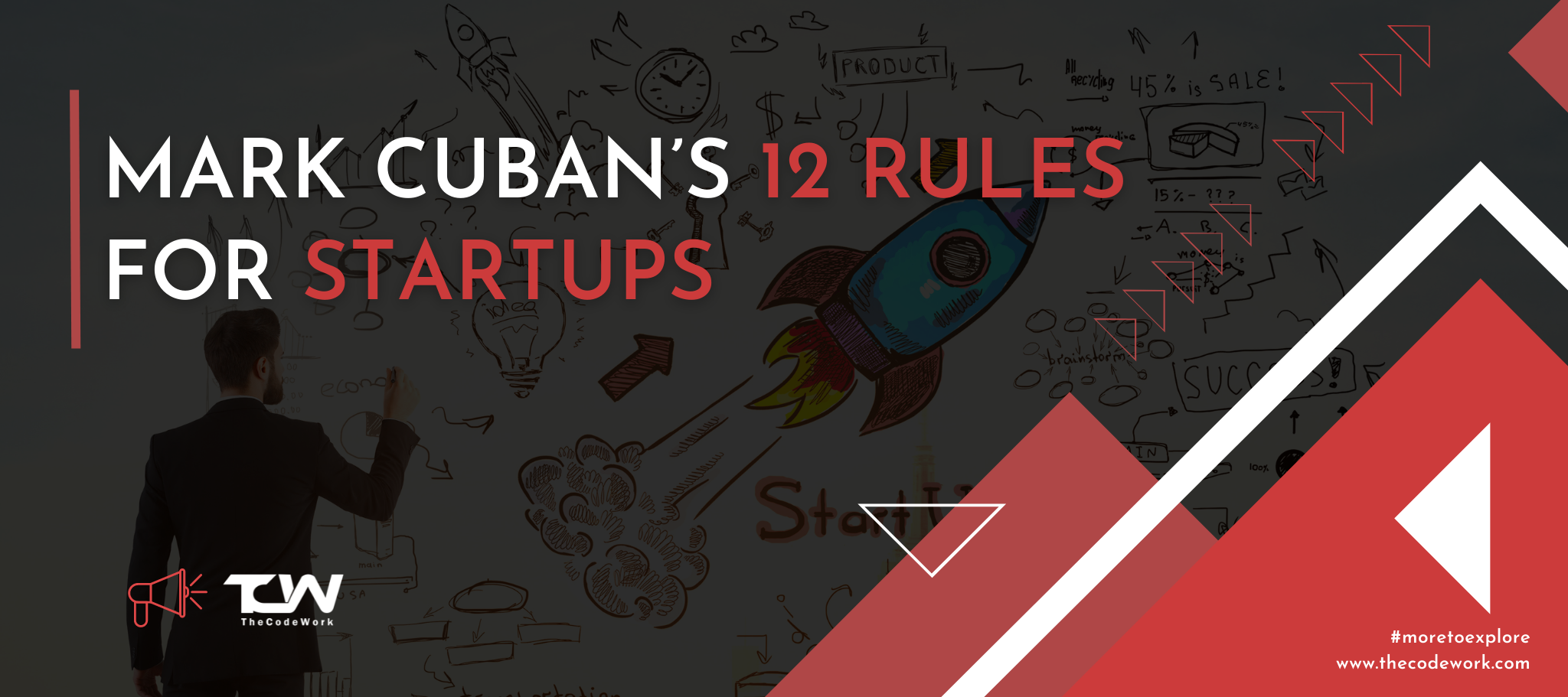Mark Cuban 12 Rules for Startups!
Team TheCodeWork


Have you given any thought to working for any startups? or maybe starting your own business? If so, the following tips for starting a business have been taken from Mark Cuban’s book ” How To Win at the Sport of Business: If I Can Do It, So Can You “
Mark, who is best known as the owner of the NBA’s Dallas Mavericks and is renowned for his frequently contentious candor, has achieved success in a number of industries. He sold his second business, Broadcast.net, to Yahoo in 1998 for $6 billion after selling his first business, MicroSolutions, for $6 million.
If any startups creator lacks the ambition to destroy the competition, large sums of money and powerful connections won’t matter for the success of the venture.
It’s fine if you plan on one day selling your company for a large sum of money, but that goal cannot distort your judgment in scaling startups, Cuban says.
When hiring, you should aim to create a team with a variety of backgrounds and viewpoints, but it’s important that they all share fundamental principles so that they can cooperate to achieve a shared goal.
According to Richard Branson, chairman of Virgin one of his many startups, in his book “The Virgin Way: “Although it’s necessary to assess a candidate’s prior accomplishments, I’ve always thought that “personality fit” is the most crucial factor to take into account. That is to say, will this person’s personality, sense of humor, and general demeanor mesh well with the culture of your business?”
According to Cuban, the most important lesson he learned in his 30s was that any business, despite of its management problems, can grow if it has built an audience.
“You can have a profitable firm if you can produce revenue,” he asserts.
Cuban advises, “Know your key abilities and focus on being exceptional at them.” “Pay more for those who have the skills you need. Choose the finest. Hire people that fit your culture yet are inexpensive outside of your key capabilities.”
Although it’s wonderful that Google offers its staff gourmet meals, massage therapists, and scooters, your business isn’t Google. Stock some drinks, possibly some coffee, and some snacks in the office when starting a firm from scratch, but spend your money on the things that are most important.
Avoid cramming your staff into cubicles and isolating yourself in a private office.
According to Cuban, “open offices keep everyone in the loop about what is happening and keep the excitement up.”
Don’t worry about the software and hardware that the rest of your industry is utilizing when you and a few workers are the only ones working in the trenches. Once you’ve found your footing, stick to what you know and upgrade to superior products and corporate standards.
“In startups, you will fail if you have managers reporting to managers,” argues Cuban.
It is best for a young company to avoid complex office politics.
For you and your team, it’s great if you want to make a few T-shirts with your company’s emblem, but don’t assume that anyone else will want one.
If you actually believe someone will wear your YoBaby.com polo when they’re out and about, you are misinformed and have no idea how to spend your money, Cuban writes. “If your people are at events and in public, it’s okay to buy for your own folks.”
Cuban is sure that a PR agency cannot assist a business in a way that makes their fee justified.
A PR firm will call or email people in the publications you already read, on the shows you already watch and the websites you already surf. Those people publish their emails.
Whenever you consume any information related to your field, get the email of the person publishing it and send them a message introducing yourself and the company. Their job is to find new stuff. They will welcome hearing from the founder instead of some PR flack.
Once you establish communication with that person, make yourself available to answer their questions about the industry and be a source for them. If you are smart, they will use you.
And finally, make sure that your employees enjoy their work and aren’t burning out.
Cuban writes that at his first company, MicroSolutions, he would hand out $100 bills to his salespeople when they had a record month and made a ritual of occasionally going to a local bar after work and ripping Kamikaze shots as a team.
TheCodeWork aims to bridge that gap between ideas and realities by introducing India’s first-ever Startup Ecosystem and listing you among all the successful entrepreneurs.
–This story first appeared on Business Insider.